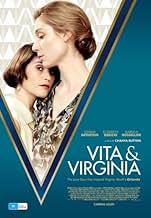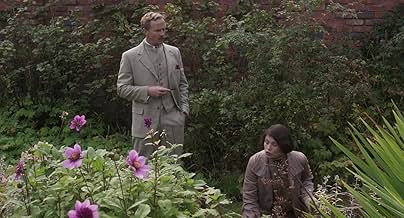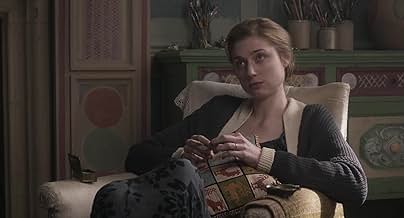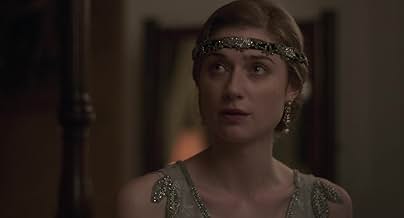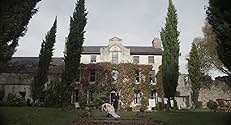IMDb RATING
5.9/10
5.2K
YOUR RATING
The fascinating true story of the love affair between socialite and popular author Vita Sackville-West and literary icon Virginia Woolf.The fascinating true story of the love affair between socialite and popular author Vita Sackville-West and literary icon Virginia Woolf.The fascinating true story of the love affair between socialite and popular author Vita Sackville-West and literary icon Virginia Woolf.
- Awards
- 1 win & 2 nominations total
Featured reviews
While the production can't be faltered, and even Virginia Woolf is impersonated quite well, there is a dramatic hole to this which is common with biographical films.
The events and the nature of the people should be more involving, more genuinely dramatic, and yet it is like the reflective scenes from a Chekhov play; somber and infected with a sense of its own importance. It doesn't make the time vivid, so much as refract the events through a literary effort. The result is tedious which is not helped by the intellectual mannerisms.
A good example here is the dullness of the Woolf circle as portrayed whereas in real life they were lively, highly sexual and amusing, amusing to the point of exhaustion. In this film they are dour; sure, we are told they are all licentious and amoral, but what we see on screen is not that.
Woolf was wickedly funny and witty. Sackville-West was verbally dexterous too. It's absent here. They are earnest and plain, and Woolf would not have tolerated that.
The outcome of this love affair is the book, 'Orlando', which if someone hasn't read it, seems a curious object. This, in a way, says much about the film, in that it is a paean to a much adored book.
Novelists, and the business of writing, are not always a success in films. Painters and musicians do better because they are more social arts, but the thrill of writing and words are, paradoxically, not easy to transmit.
The book which emerged from the affair has some prestige, though, for its ardent fans, it's best to avoid Nabokov's assessment of it: he described Orlando as pretentious, bourgeois, nonsense; a view in part, which has tended to loom over Woolf's entire body of work. Nabokov's insight may well apply to this film too. Well, Woolf was very sharp at criticism too.
The events and the nature of the people should be more involving, more genuinely dramatic, and yet it is like the reflective scenes from a Chekhov play; somber and infected with a sense of its own importance. It doesn't make the time vivid, so much as refract the events through a literary effort. The result is tedious which is not helped by the intellectual mannerisms.
A good example here is the dullness of the Woolf circle as portrayed whereas in real life they were lively, highly sexual and amusing, amusing to the point of exhaustion. In this film they are dour; sure, we are told they are all licentious and amoral, but what we see on screen is not that.
Woolf was wickedly funny and witty. Sackville-West was verbally dexterous too. It's absent here. They are earnest and plain, and Woolf would not have tolerated that.
The outcome of this love affair is the book, 'Orlando', which if someone hasn't read it, seems a curious object. This, in a way, says much about the film, in that it is a paean to a much adored book.
Novelists, and the business of writing, are not always a success in films. Painters and musicians do better because they are more social arts, but the thrill of writing and words are, paradoxically, not easy to transmit.
The book which emerged from the affair has some prestige, though, for its ardent fans, it's best to avoid Nabokov's assessment of it: he described Orlando as pretentious, bourgeois, nonsense; a view in part, which has tended to loom over Woolf's entire body of work. Nabokov's insight may well apply to this film too. Well, Woolf was very sharp at criticism too.
The characters speak in cryptic tongues, and I just don't understand the story. Everything else is beautiful from the sets to the costumes. Too bad I just cannot connect with the main characters at all.
First, let me say I'd go see Gemma Arterton reading the phone book: she has the rare facility of being able to play period stories as well as contemporary ones. She's great as Gemma Bovery and the Duchess of Malfi. She's well supported by Isabella Rossellini as Lady Sackville who tries without success to call Vita back to reality.
Second, what quirk of casting gave us Elizabeth Debicky, not yet thirty, as Virginia Woolf who started her three-year relationship (1925-28) with Vita at age 43? She just can't carry off the part of a woman in early middle age, and what's more she has this irritating drawl/vocal fry that put me off for most of the picture. So if you wish to see this interesting story, be aware it's been handled before (Portrait of a Marriage, The Hours) and sometimes better.
Second, what quirk of casting gave us Elizabeth Debicky, not yet thirty, as Virginia Woolf who started her three-year relationship (1925-28) with Vita at age 43? She just can't carry off the part of a woman in early middle age, and what's more she has this irritating drawl/vocal fry that put me off for most of the picture. So if you wish to see this interesting story, be aware it's been handled before (Portrait of a Marriage, The Hours) and sometimes better.
2018 saw several historical dramas about lesbianism, including the fictitious "Tell It to the Bees" and three about real historical figures, even if doubts have sometimes been expressed about their historical accuracy. "The Favourite" dealt with the triangular relationship between Queen Anne, Sarah Churchill and Abigail Masham, and "Colette" told the story of the bisexual French novelist of that name. "Vita & Virginia" is about two more bisexual literary figures, Vita Sackville-West and Virginia Woolf.
As the story opens, in the England of the 1920s, Vita and Virginia are both well-known writers, but do not know each other personally because they move in different social circles. Vita is a politically and socially conservative aristocrat, whereas Virginia is part of the liberal, progressive Bloomsbury Group. Now that Virginia Woolf has become such a well-established part of the canon of English Literature ("From Beowulf to Virginia Woolf"), it seems strange to think that during their lifetimes it was Vita Sackville-West who was regarded as the more significant writer, both in terms of book sales and in terms of critical acclaim.
Vita, however, is fascinated by the other woman's work, and is determined to make her acquaintance. The two women, as portrayed here by Gemma Arterton and Elizabeth Debicki, are very different in personality. Debicki's Virginia is shy and retiring, and physically and mentally frail, whereas Arterton's Vita is outgoing, lively and magnetic. (Was Vita's vitality, I wonder, the reason for her nickname? She was officially baptised Victoria Mary, but was always known as Vita, Latin for "life"). When the two meet, however, they quickly become friends, despite their differences, and eventually lovers. Her relationship with Vita inspires Virginia's "Orlando", one of her best-known novels and her first major popular success.
One criticism that has been made is that Debicki is too young for the role of Virginia, and there is some justice in this. Virginia she was the older of the women by eight years, but Debicki is four years younger than Arterton. At least, however, she doesn't rely upon a false nose like Nicole Kidman did when playing Virginia in "The Hours".
Both women were married, and their husbands play important, if subsidiary, roles in this drama. Vita had a famously open marriage to the diplomat Harold Nicolson, who was himself bisexual and had relationships with other men. In the film he is depicted as having no objection to his wife's lesbian friendships, although he does wish she could be more discreet about them. (Her previous affair with Violet Trefusis caused a scandal which damaged his career). Virginia's publisher husband Leonard is not enthusiastic about her relationship but feels it is for the best if he tolerates it, given her fragile mental state.
Some may think that the film is too passionless, a presentation of a well-mannered, drawing-room form of lesbianism. Again, there might be some justice in this, although I suspect that such criticisms are most likely to come from those who expected, and hoped, that the film would be more sensual and erotic than it actually is. The film was never intended to be a piece of erotica, and I think that there are reasons why it is less passionate than one might expect. In the first place, it deals with events which took place nearly a hundred years ago, a period when the British still believed in the idea of the "stiff upper lip", far more than they do today. As a result people tended to behave in a more restrained manner, at least in public; open displays of strong feelings were discouraged. This was especially true when those feelings existed between two women; although lesbianism, unlike male homosexuality, was never illegal in Britain, it was still the subject of great social disapproval.
Secondly, in the version of events put forward here, Vita has had several earlier affairs with other women, whereas this is Virginia's first lesbian relationship. Debicki plays her not as a woman in the throes of a grand passion but as someone rather uncertainly exploring and discovering new aspects of her sexuality. The result is a film which is certainly restrained, but this seems appropriate to its period and to its subject-matter. It is, in fact, the restraint with which writer-director Chanya Button and her co-writer Eileen Atkins bring to their story which enables them to explore the psychology of their two main characters in such depth. 7/10
As the story opens, in the England of the 1920s, Vita and Virginia are both well-known writers, but do not know each other personally because they move in different social circles. Vita is a politically and socially conservative aristocrat, whereas Virginia is part of the liberal, progressive Bloomsbury Group. Now that Virginia Woolf has become such a well-established part of the canon of English Literature ("From Beowulf to Virginia Woolf"), it seems strange to think that during their lifetimes it was Vita Sackville-West who was regarded as the more significant writer, both in terms of book sales and in terms of critical acclaim.
Vita, however, is fascinated by the other woman's work, and is determined to make her acquaintance. The two women, as portrayed here by Gemma Arterton and Elizabeth Debicki, are very different in personality. Debicki's Virginia is shy and retiring, and physically and mentally frail, whereas Arterton's Vita is outgoing, lively and magnetic. (Was Vita's vitality, I wonder, the reason for her nickname? She was officially baptised Victoria Mary, but was always known as Vita, Latin for "life"). When the two meet, however, they quickly become friends, despite their differences, and eventually lovers. Her relationship with Vita inspires Virginia's "Orlando", one of her best-known novels and her first major popular success.
One criticism that has been made is that Debicki is too young for the role of Virginia, and there is some justice in this. Virginia she was the older of the women by eight years, but Debicki is four years younger than Arterton. At least, however, she doesn't rely upon a false nose like Nicole Kidman did when playing Virginia in "The Hours".
Both women were married, and their husbands play important, if subsidiary, roles in this drama. Vita had a famously open marriage to the diplomat Harold Nicolson, who was himself bisexual and had relationships with other men. In the film he is depicted as having no objection to his wife's lesbian friendships, although he does wish she could be more discreet about them. (Her previous affair with Violet Trefusis caused a scandal which damaged his career). Virginia's publisher husband Leonard is not enthusiastic about her relationship but feels it is for the best if he tolerates it, given her fragile mental state.
Some may think that the film is too passionless, a presentation of a well-mannered, drawing-room form of lesbianism. Again, there might be some justice in this, although I suspect that such criticisms are most likely to come from those who expected, and hoped, that the film would be more sensual and erotic than it actually is. The film was never intended to be a piece of erotica, and I think that there are reasons why it is less passionate than one might expect. In the first place, it deals with events which took place nearly a hundred years ago, a period when the British still believed in the idea of the "stiff upper lip", far more than they do today. As a result people tended to behave in a more restrained manner, at least in public; open displays of strong feelings were discouraged. This was especially true when those feelings existed between two women; although lesbianism, unlike male homosexuality, was never illegal in Britain, it was still the subject of great social disapproval.
Secondly, in the version of events put forward here, Vita has had several earlier affairs with other women, whereas this is Virginia's first lesbian relationship. Debicki plays her not as a woman in the throes of a grand passion but as someone rather uncertainly exploring and discovering new aspects of her sexuality. The result is a film which is certainly restrained, but this seems appropriate to its period and to its subject-matter. It is, in fact, the restraint with which writer-director Chanya Button and her co-writer Eileen Atkins bring to their story which enables them to explore the psychology of their two main characters in such depth. 7/10
I have to admit, I am only borrowing or tweaking a title of another movie because it does fit quite perfectly here. I am not a scholar of either of the two real life figures portrayed here and could not tell you how much of what we see here supposedly happened exactly the way it is shown. Or close to the way it is shown I reckon.
Having said that, it seems to be another forbidden love situation. Extremely good acting and the mentioned setting make this a movie that some will love a lot. On the other hand, since the pacing is slow and the time period may not be to everyones taste, there may also be a lot of dislike to what is being served.
Vita and Virginia - as the title suggests the movie draws its power mostly from the interaction of these two characters - which is more than enough for me.
Having said that, it seems to be another forbidden love situation. Extremely good acting and the mentioned setting make this a movie that some will love a lot. On the other hand, since the pacing is slow and the time period may not be to everyones taste, there may also be a lot of dislike to what is being served.
Vita and Virginia - as the title suggests the movie draws its power mostly from the interaction of these two characters - which is more than enough for me.
Did you know
- TriviaBoth this film and the play on which it is based were derived from letters between Vita Sackville-West and acclaimed author Virginia Woolf.
- GoofsDriving in a convertible with the top down, neither woman has windblown hair.
- Quotes
Harold Nicolson: I hear nothing but reports of her madness.
Vita Sackville-West: Madness, what a convenient way to explain away her genius.
- ConnectionsFeatured in London's Hollywood: Welcome to Pinewood (2006)
- How long is Vita & Virginia?Powered by Alexa
Details
- Release date
- Countries of origin
- Official site
- Language
- Also known as
- Vita & Virginia
- Filming locations
- Production companies
- See more company credits at IMDbPro
Box office
- Gross US & Canada
- $42,741
- Opening weekend US & Canada
- $3,408
- Aug 25, 2019
- Gross worldwide
- $800,675
- Runtime1 hour 50 minutes
- Color
- Aspect ratio
- 1.85 : 1
Contribute to this page
Suggest an edit or add missing content


![Watch Trailer [OV]](https://m.media-amazon.com/images/M/MV5BZDRkNTdiN2MtNzE4MC00NDU1LThjOTMtMTA0YzEyYmQwOThlXkEyXkFqcGdeQXRyYW5zY29kZS13b3JrZmxvdw@@._V1_QL75_UX500_CR0)






